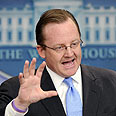
US: Freeze to be discussed in talks
Two days before launching direct peace talks, US State Department spokesman says all core issues, including construction freeze in settlements, to be discussed during Washington summit
WASHINGTON – While Israel hopes to find a "creative" solution" that will allow it to launch direct talks with the Palestinians and resume construction in the settlements at the same time, US State Department Spokesman Philip Crowley said on Monday that core issues, including the construction freeze, will be put on the table during the upcoming summit.
Meanwhile,White House Spokesman Robert Gibbs also commented on the nearing negotiations, saying the summit is a regional interest that has nothing to do with other issues, such as US's military withdrawal from Iraq.
Gibbs added that although he believes both sides were serious about achieving peace, it doesn't mean the process will be easy, noting that similar attempts have been made throughout the past three decades.
Unlike Crowley, Gibbs refused to address the construction freeze – scheduled to expire on Sept. 26 – and preferred focusing on the near future.
The White House spokesman said people should be focused on the 1st and 2nd of September, and that it was too early to predict what will happen later in the month.
US Special Envoy to the Middle East George Mitchell is scheduled to arrive to Washington Tuesday morning, and update the president on meetings he held with both sides prior to launching direct talks.
Obama will kick off the triple summit on Wednesday; and US Secretary of State Hillary Clinton will take the reins during the actual talks, slated to begin Thursday.
Former US President George W. Bush's advisor, Stephen Hadley warned the parties of a third failure, after attempts to launch peace talks at Annapolis and Camp David proved unsuccessful.
However, Hadley also said there is room for optimism, noting that both Palestinian President Mahmoud Abbas and Prime Minister Salam Fayyad were actively building institutions and controlling security.
The former presidential advisor said the two sides should base future negotiations on former talks, especially on matters related to border placement and security arrangements.
- Follow Ynetnews on Facebook










